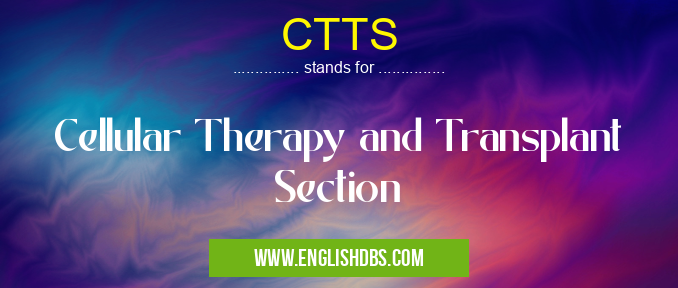What does CTTS mean in TRANSPLANTATION
CTTS stands for Cellular Therapy and Transplant Section. It is a specialized medical unit within a hospital or healthcare institution that focuses on the treatment of diseases and conditions through the use of cellular therapies and transplant procedures.

CTTS meaning in Transplantation in Medical
CTTS mostly used in an acronym Transplantation in Category Medical that means Cellular Therapy and Transplant Section
Shorthand: CTTS,
Full Form: Cellular Therapy and Transplant Section
For more information of "Cellular Therapy and Transplant Section", see the section below.
What is CTTS?
The CTTS is responsible for:
- Cellular Therapy: Utilizing living cells to treat or prevent diseases. This includes therapies such as stem cell transplantation, CAR T-cell therapy, and immune cell therapies.
- Transplant Procedures: Performing surgical procedures to replace or repair damaged organs or tissues with healthy ones. This includes bone marrow transplantation, organ transplantation, and tissue transplantation.
Role of CTTS
The CTTS plays a crucial role in the management of a wide range of conditions, including:
- Blood cancers (e.g., leukemia, lymphoma)
- Immune disorders (e.g., autoimmune diseases)
- Genetic disorders
- Organ failure
Services Provided by CTTS
CTTS typically provides a range of services, such as:
- Consultation and evaluation
- Treatment planning and coordination
- Stem cell collection and processing
- Transplantation procedures
- Post-transplant care and monitoring
- Research and clinical trials
Essential Questions and Answers on Cellular Therapy and Transplant Section in "MEDICAL»TRANSPLANTATION"
What is the Cellular Therapy and Transplant Section (CTTS)?
CTTS is a specialized unit within a healthcare institution that provides comprehensive care and treatment for patients with blood-related cancers and other hematologic disorders. It focuses on innovative cellular therapies and stem cell transplantation.
What types of treatments are provided by CTTS?
CTTS offers a range of treatments, including:
- Autologous stem cell transplantation: Using the patient's own stem cells to replace damaged or diseased bone marrow.
- Allogeneic stem cell transplantation: Using stem cells from a healthy donor to replace damaged or diseased bone marrow.
- Chimeric antigen receptor (CAR) T-cell therapy: A form of immunotherapy that modifies T cells to target cancer cells.
- Bone marrow transplant for non-malignant conditions, such as sickle cell disease and thalassemia.
Who is eligible for cellular therapy and transplant treatments?
Eligibility for cellular therapy and transplant treatments depends on various factors, including the type of cancer or hematologic disorder, the patient's overall health, and the availability of a suitable donor (for allogeneic transplants). A multidisciplinary team of specialists, including physicians, nurses, and social workers, will assess each patient's eligibility and discuss treatment options.
What are the potential benefits of cellular therapy and transplant treatments?
Cellular therapy and transplant treatments offer the potential to provide:
- Cures or long-term remissions for patients with advanced blood-related cancers or other hematologic disorders.
- Improved quality of life by reducing symptoms and improving overall health.
- New treatment options for patients who have not responded to conventional therapies.
What are the potential risks and side effects of cellular therapy and transplant treatments?
Cellular therapy and transplant treatments involve complex medical procedures and can carry potential risks and side effects, such as:
- Infection: Patients undergoing stem cell transplantation are at an increased risk of developing infections due to their suppressed immune systems.
- Graft-versus-host disease (GvHD): A condition that can occur when donor stem cells attack the patient's body tissues.
- Relapse: The cancer or hematologic disorder may return after treatment.
- Other potential side effects include fatigue, nausea, vomiting, and hair loss.
Final Words: CTTS is an integral part of modern healthcare, offering innovative and life-saving treatments for complex medical conditions. Through its expertise in cellular therapies and transplant procedures, the CTTS helps to improve the outcomes and quality of life for patients with various diseases.
